Business Ethics: An Analysis of Australian Fashion Brands' Ethics
VerifiedAdded on 2021/06/18
|10
|2761
|66
Essay
AI Summary
This essay examines the ethical practices of Australian fashion brands, focusing on their performance in relation to worker rights and corporate social responsibility (CSR). It begins by referencing the 2018 Ethical Fashion Report, which revealed that many top Australian brands received a C rating due to issues in their supply chains and worker treatment. The essay summarizes arguments related to labor rights, legal implications, and the importance of transparency in the fashion industry. It highlights ethical issues like inadequate living wages, lack of transparency, and the potential for worker exploitation, as well as the increasing pressure on global brands to improve conditions for garment workers in developing countries. The discussion extends to the concept of CSR, emphasizing how companies should operate ethically, ensuring a positive impact on society and their employees. The essay contrasts ethical and unethical decisions, providing examples such as the Rana Plaza factory collapse and Nestle's marketing practices. Finally, it outlines ethical decision-making processes, introducing seven moral philosophies, including teleology, egoism, deontology, utilitarianism, virtue ethics, relativism, and justice, to provide a comprehensive understanding of ethical considerations in the business world.
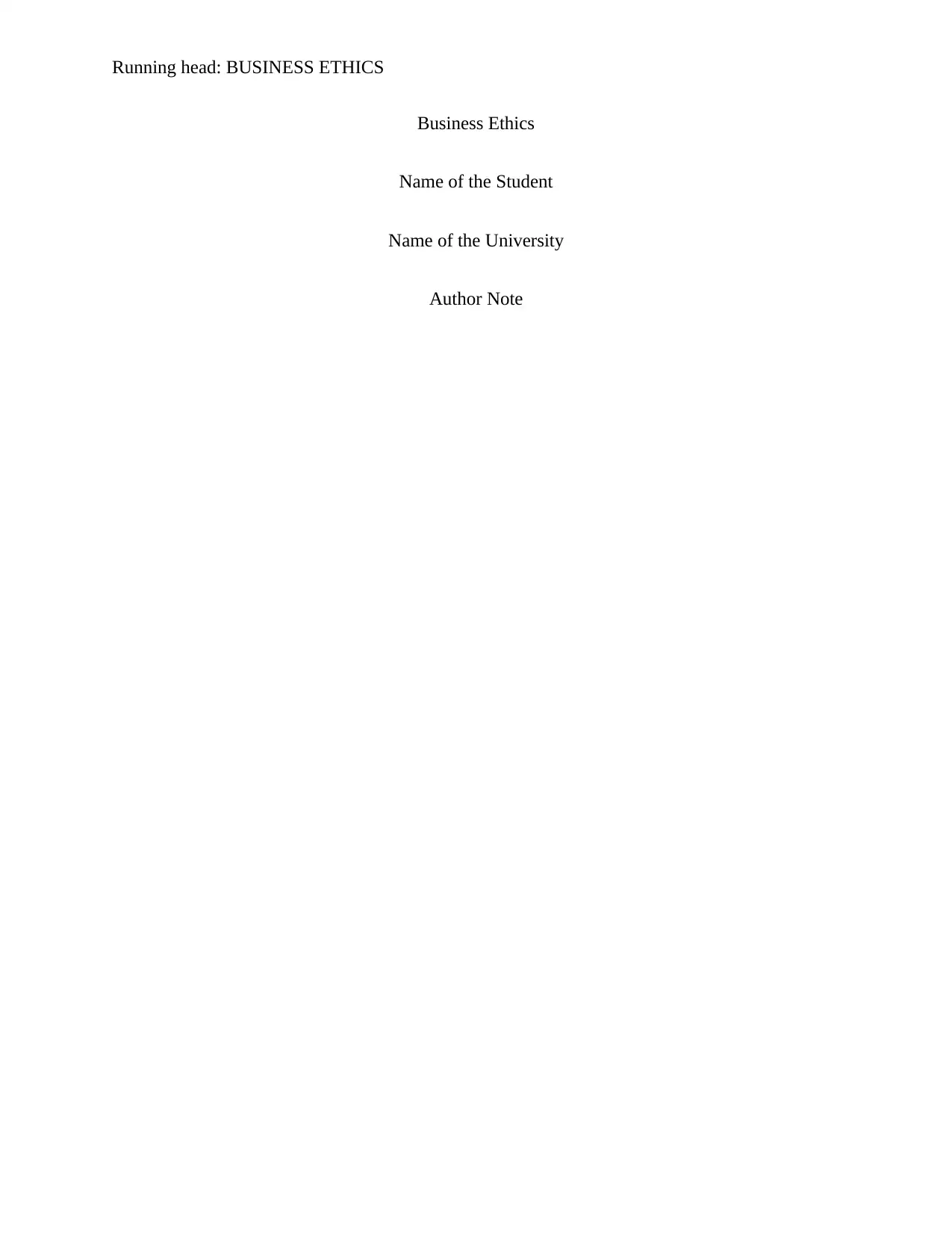
Running head: BUSINESS ETHICS
Business Ethics
Name of the Student
Name of the University
Author Note
Business Ethics
Name of the Student
Name of the University
Author Note
Paraphrase This Document
Need a fresh take? Get an instant paraphrase of this document with our AI Paraphraser
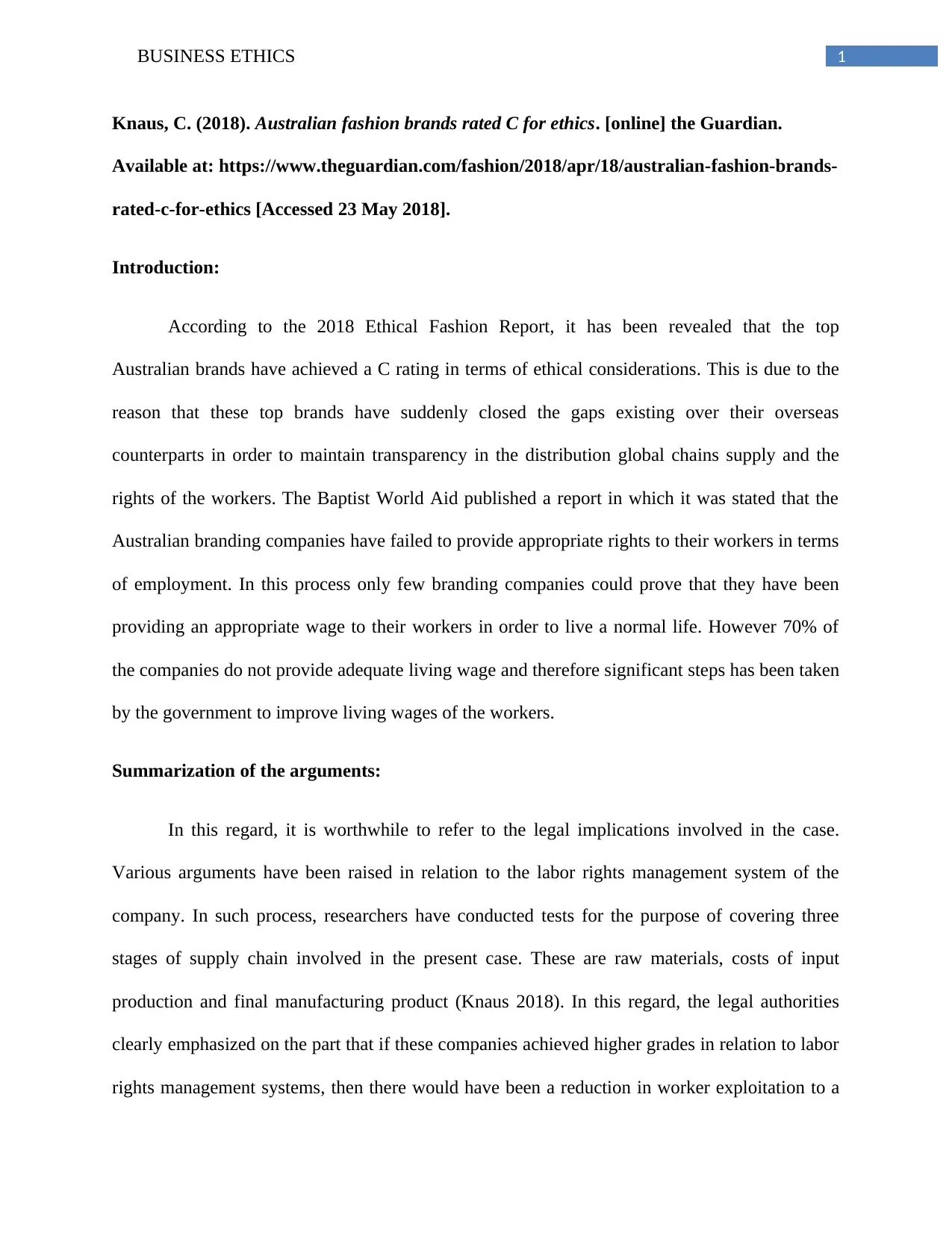
1BUSINESS ETHICS
Knaus, C. (2018). Australian fashion brands rated C for ethics. [online] the Guardian.
Available at: https://www.theguardian.com/fashion/2018/apr/18/australian-fashion-brands-
rated-c-for-ethics [Accessed 23 May 2018].
Introduction:
According to the 2018 Ethical Fashion Report, it has been revealed that the top
Australian brands have achieved a C rating in terms of ethical considerations. This is due to the
reason that these top brands have suddenly closed the gaps existing over their overseas
counterparts in order to maintain transparency in the distribution global chains supply and the
rights of the workers. The Baptist World Aid published a report in which it was stated that the
Australian branding companies have failed to provide appropriate rights to their workers in terms
of employment. In this process only few branding companies could prove that they have been
providing an appropriate wage to their workers in order to live a normal life. However 70% of
the companies do not provide adequate living wage and therefore significant steps has been taken
by the government to improve living wages of the workers.
Summarization of the arguments:
In this regard, it is worthwhile to refer to the legal implications involved in the case.
Various arguments have been raised in relation to the labor rights management system of the
company. In such process, researchers have conducted tests for the purpose of covering three
stages of supply chain involved in the present case. These are raw materials, costs of input
production and final manufacturing product (Knaus 2018). In this regard, the legal authorities
clearly emphasized on the part that if these companies achieved higher grades in relation to labor
rights management systems, then there would have been a reduction in worker exploitation to a
Knaus, C. (2018). Australian fashion brands rated C for ethics. [online] the Guardian.
Available at: https://www.theguardian.com/fashion/2018/apr/18/australian-fashion-brands-
rated-c-for-ethics [Accessed 23 May 2018].
Introduction:
According to the 2018 Ethical Fashion Report, it has been revealed that the top
Australian brands have achieved a C rating in terms of ethical considerations. This is due to the
reason that these top brands have suddenly closed the gaps existing over their overseas
counterparts in order to maintain transparency in the distribution global chains supply and the
rights of the workers. The Baptist World Aid published a report in which it was stated that the
Australian branding companies have failed to provide appropriate rights to their workers in terms
of employment. In this process only few branding companies could prove that they have been
providing an appropriate wage to their workers in order to live a normal life. However 70% of
the companies do not provide adequate living wage and therefore significant steps has been taken
by the government to improve living wages of the workers.
Summarization of the arguments:
In this regard, it is worthwhile to refer to the legal implications involved in the case.
Various arguments have been raised in relation to the labor rights management system of the
company. In such process, researchers have conducted tests for the purpose of covering three
stages of supply chain involved in the present case. These are raw materials, costs of input
production and final manufacturing product (Knaus 2018). In this regard, the legal authorities
clearly emphasized on the part that if these companies achieved higher grades in relation to labor
rights management systems, then there would have been a reduction in worker exploitation to a
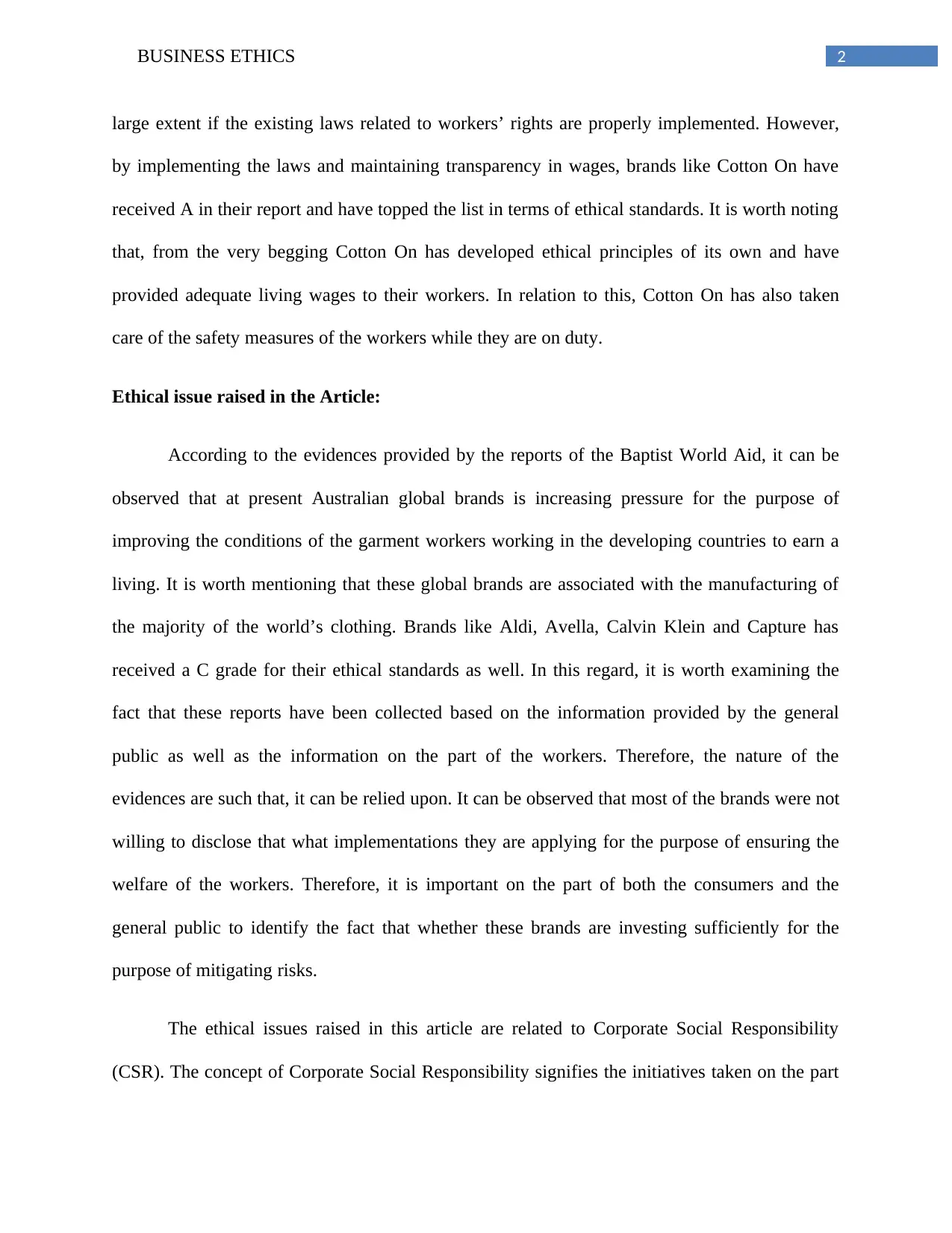
2BUSINESS ETHICS
large extent if the existing laws related to workers’ rights are properly implemented. However,
by implementing the laws and maintaining transparency in wages, brands like Cotton On have
received A in their report and have topped the list in terms of ethical standards. It is worth noting
that, from the very begging Cotton On has developed ethical principles of its own and have
provided adequate living wages to their workers. In relation to this, Cotton On has also taken
care of the safety measures of the workers while they are on duty.
Ethical issue raised in the Article:
According to the evidences provided by the reports of the Baptist World Aid, it can be
observed that at present Australian global brands is increasing pressure for the purpose of
improving the conditions of the garment workers working in the developing countries to earn a
living. It is worth mentioning that these global brands are associated with the manufacturing of
the majority of the world’s clothing. Brands like Aldi, Avella, Calvin Klein and Capture has
received a C grade for their ethical standards as well. In this regard, it is worth examining the
fact that these reports have been collected based on the information provided by the general
public as well as the information on the part of the workers. Therefore, the nature of the
evidences are such that, it can be relied upon. It can be observed that most of the brands were not
willing to disclose that what implementations they are applying for the purpose of ensuring the
welfare of the workers. Therefore, it is important on the part of both the consumers and the
general public to identify the fact that whether these brands are investing sufficiently for the
purpose of mitigating risks.
The ethical issues raised in this article are related to Corporate Social Responsibility
(CSR). The concept of Corporate Social Responsibility signifies the initiatives taken on the part
large extent if the existing laws related to workers’ rights are properly implemented. However,
by implementing the laws and maintaining transparency in wages, brands like Cotton On have
received A in their report and have topped the list in terms of ethical standards. It is worth noting
that, from the very begging Cotton On has developed ethical principles of its own and have
provided adequate living wages to their workers. In relation to this, Cotton On has also taken
care of the safety measures of the workers while they are on duty.
Ethical issue raised in the Article:
According to the evidences provided by the reports of the Baptist World Aid, it can be
observed that at present Australian global brands is increasing pressure for the purpose of
improving the conditions of the garment workers working in the developing countries to earn a
living. It is worth mentioning that these global brands are associated with the manufacturing of
the majority of the world’s clothing. Brands like Aldi, Avella, Calvin Klein and Capture has
received a C grade for their ethical standards as well. In this regard, it is worth examining the
fact that these reports have been collected based on the information provided by the general
public as well as the information on the part of the workers. Therefore, the nature of the
evidences are such that, it can be relied upon. It can be observed that most of the brands were not
willing to disclose that what implementations they are applying for the purpose of ensuring the
welfare of the workers. Therefore, it is important on the part of both the consumers and the
general public to identify the fact that whether these brands are investing sufficiently for the
purpose of mitigating risks.
The ethical issues raised in this article are related to Corporate Social Responsibility
(CSR). The concept of Corporate Social Responsibility signifies the initiatives taken on the part
⊘ This is a preview!⊘
Do you want full access?
Subscribe today to unlock all pages.

Trusted by 1+ million students worldwide
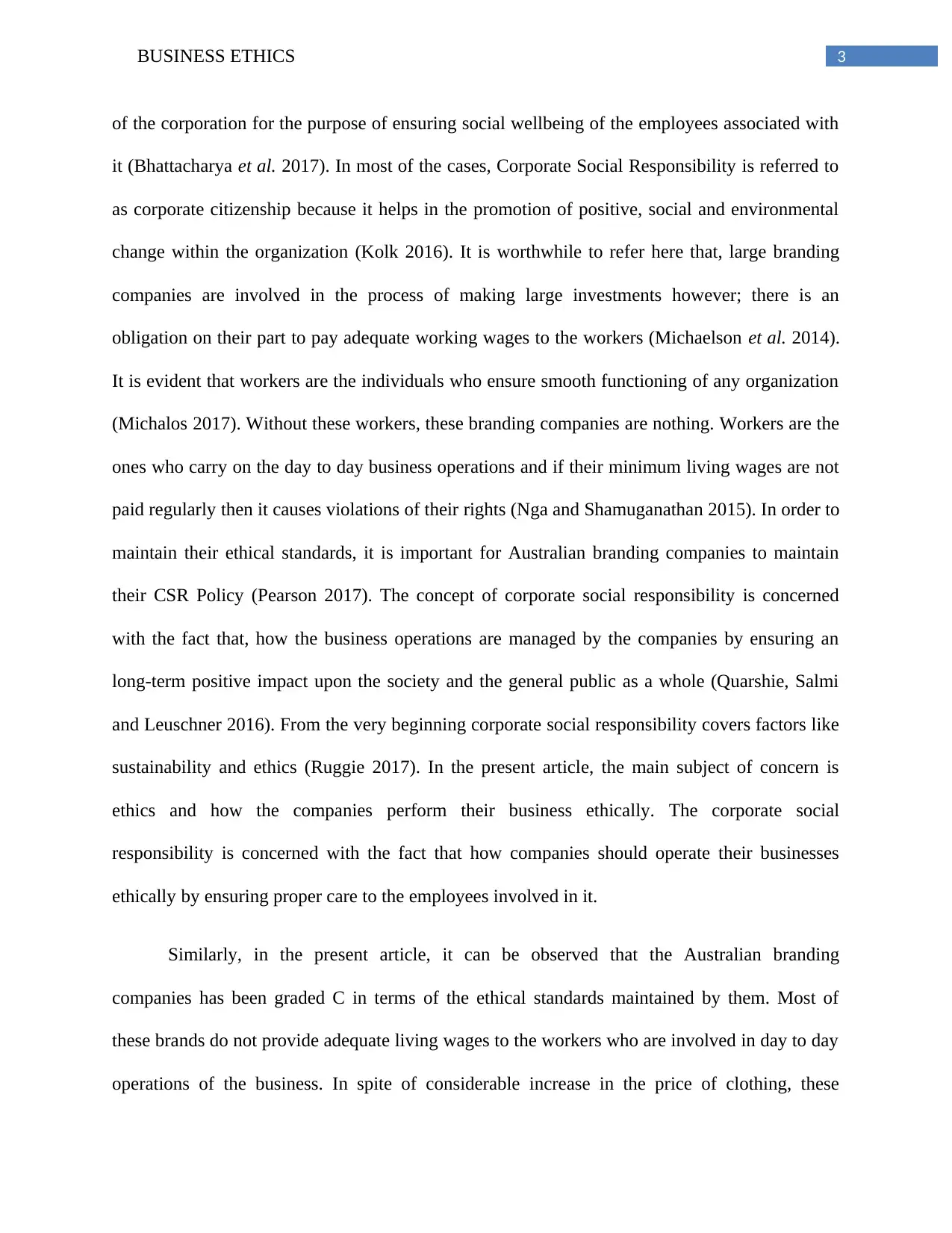
3BUSINESS ETHICS
of the corporation for the purpose of ensuring social wellbeing of the employees associated with
it (Bhattacharya et al. 2017). In most of the cases, Corporate Social Responsibility is referred to
as corporate citizenship because it helps in the promotion of positive, social and environmental
change within the organization (Kolk 2016). It is worthwhile to refer here that, large branding
companies are involved in the process of making large investments however; there is an
obligation on their part to pay adequate working wages to the workers (Michaelson et al. 2014).
It is evident that workers are the individuals who ensure smooth functioning of any organization
(Michalos 2017). Without these workers, these branding companies are nothing. Workers are the
ones who carry on the day to day business operations and if their minimum living wages are not
paid regularly then it causes violations of their rights (Nga and Shamuganathan 2015). In order to
maintain their ethical standards, it is important for Australian branding companies to maintain
their CSR Policy (Pearson 2017). The concept of corporate social responsibility is concerned
with the fact that, how the business operations are managed by the companies by ensuring an
long-term positive impact upon the society and the general public as a whole (Quarshie, Salmi
and Leuschner 2016). From the very beginning corporate social responsibility covers factors like
sustainability and ethics (Ruggie 2017). In the present article, the main subject of concern is
ethics and how the companies perform their business ethically. The corporate social
responsibility is concerned with the fact that how companies should operate their businesses
ethically by ensuring proper care to the employees involved in it.
Similarly, in the present article, it can be observed that the Australian branding
companies has been graded C in terms of the ethical standards maintained by them. Most of
these brands do not provide adequate living wages to the workers who are involved in day to day
operations of the business. In spite of considerable increase in the price of clothing, these
of the corporation for the purpose of ensuring social wellbeing of the employees associated with
it (Bhattacharya et al. 2017). In most of the cases, Corporate Social Responsibility is referred to
as corporate citizenship because it helps in the promotion of positive, social and environmental
change within the organization (Kolk 2016). It is worthwhile to refer here that, large branding
companies are involved in the process of making large investments however; there is an
obligation on their part to pay adequate working wages to the workers (Michaelson et al. 2014).
It is evident that workers are the individuals who ensure smooth functioning of any organization
(Michalos 2017). Without these workers, these branding companies are nothing. Workers are the
ones who carry on the day to day business operations and if their minimum living wages are not
paid regularly then it causes violations of their rights (Nga and Shamuganathan 2015). In order to
maintain their ethical standards, it is important for Australian branding companies to maintain
their CSR Policy (Pearson 2017). The concept of corporate social responsibility is concerned
with the fact that, how the business operations are managed by the companies by ensuring an
long-term positive impact upon the society and the general public as a whole (Quarshie, Salmi
and Leuschner 2016). From the very beginning corporate social responsibility covers factors like
sustainability and ethics (Ruggie 2017). In the present article, the main subject of concern is
ethics and how the companies perform their business ethically. The corporate social
responsibility is concerned with the fact that how companies should operate their businesses
ethically by ensuring proper care to the employees involved in it.
Similarly, in the present article, it can be observed that the Australian branding
companies has been graded C in terms of the ethical standards maintained by them. Most of
these brands do not provide adequate living wages to the workers who are involved in day to day
operations of the business. In spite of considerable increase in the price of clothing, these
Paraphrase This Document
Need a fresh take? Get an instant paraphrase of this document with our AI Paraphraser
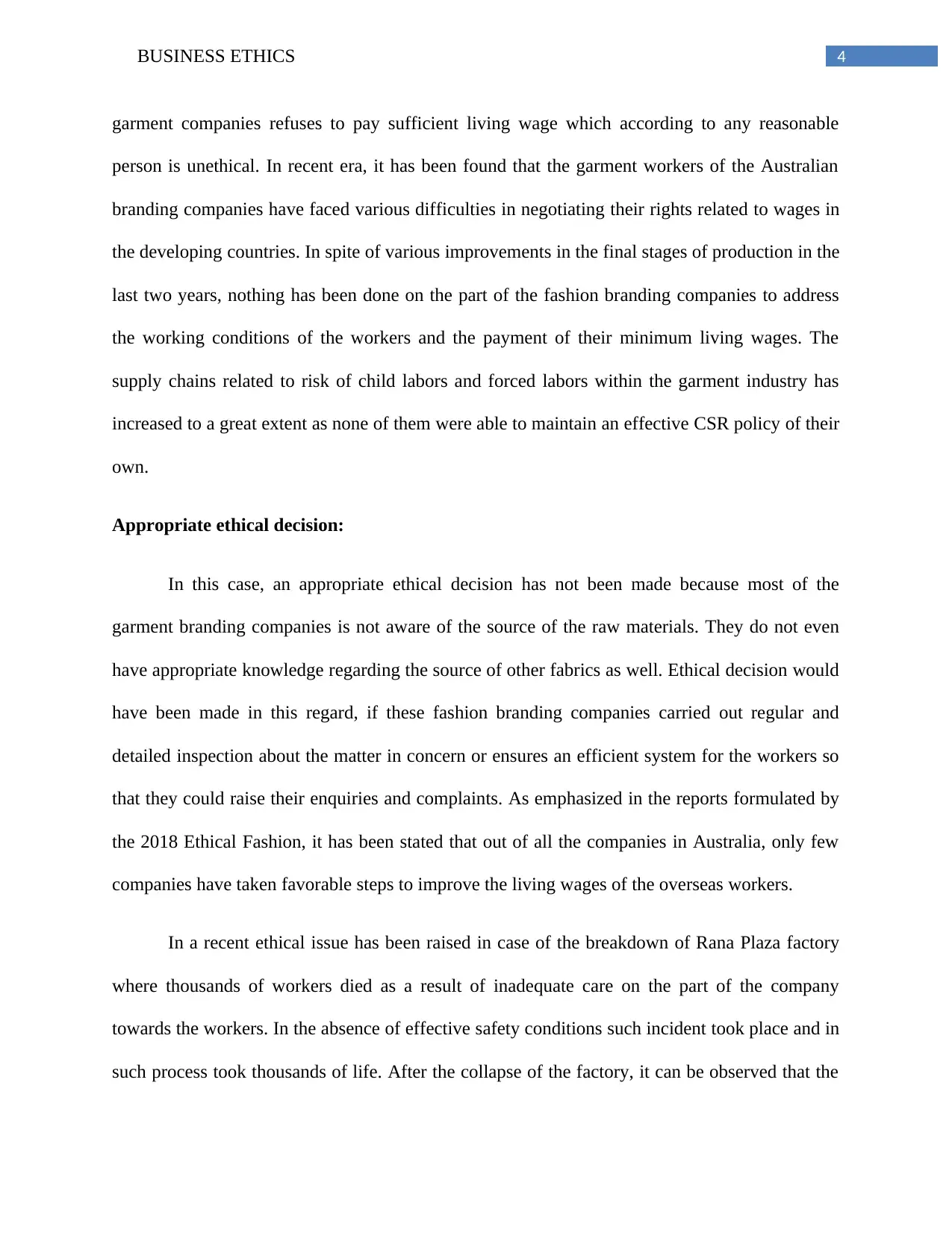
4BUSINESS ETHICS
garment companies refuses to pay sufficient living wage which according to any reasonable
person is unethical. In recent era, it has been found that the garment workers of the Australian
branding companies have faced various difficulties in negotiating their rights related to wages in
the developing countries. In spite of various improvements in the final stages of production in the
last two years, nothing has been done on the part of the fashion branding companies to address
the working conditions of the workers and the payment of their minimum living wages. The
supply chains related to risk of child labors and forced labors within the garment industry has
increased to a great extent as none of them were able to maintain an effective CSR policy of their
own.
Appropriate ethical decision:
In this case, an appropriate ethical decision has not been made because most of the
garment branding companies is not aware of the source of the raw materials. They do not even
have appropriate knowledge regarding the source of other fabrics as well. Ethical decision would
have been made in this regard, if these fashion branding companies carried out regular and
detailed inspection about the matter in concern or ensures an efficient system for the workers so
that they could raise their enquiries and complaints. As emphasized in the reports formulated by
the 2018 Ethical Fashion, it has been stated that out of all the companies in Australia, only few
companies have taken favorable steps to improve the living wages of the overseas workers.
In a recent ethical issue has been raised in case of the breakdown of Rana Plaza factory
where thousands of workers died as a result of inadequate care on the part of the company
towards the workers. In the absence of effective safety conditions such incident took place and in
such process took thousands of life. After the collapse of the factory, it can be observed that the
garment companies refuses to pay sufficient living wage which according to any reasonable
person is unethical. In recent era, it has been found that the garment workers of the Australian
branding companies have faced various difficulties in negotiating their rights related to wages in
the developing countries. In spite of various improvements in the final stages of production in the
last two years, nothing has been done on the part of the fashion branding companies to address
the working conditions of the workers and the payment of their minimum living wages. The
supply chains related to risk of child labors and forced labors within the garment industry has
increased to a great extent as none of them were able to maintain an effective CSR policy of their
own.
Appropriate ethical decision:
In this case, an appropriate ethical decision has not been made because most of the
garment branding companies is not aware of the source of the raw materials. They do not even
have appropriate knowledge regarding the source of other fabrics as well. Ethical decision would
have been made in this regard, if these fashion branding companies carried out regular and
detailed inspection about the matter in concern or ensures an efficient system for the workers so
that they could raise their enquiries and complaints. As emphasized in the reports formulated by
the 2018 Ethical Fashion, it has been stated that out of all the companies in Australia, only few
companies have taken favorable steps to improve the living wages of the overseas workers.
In a recent ethical issue has been raised in case of the breakdown of Rana Plaza factory
where thousands of workers died as a result of inadequate care on the part of the company
towards the workers. In the absence of effective safety conditions such incident took place and in
such process took thousands of life. After the collapse of the factory, it can be observed that the
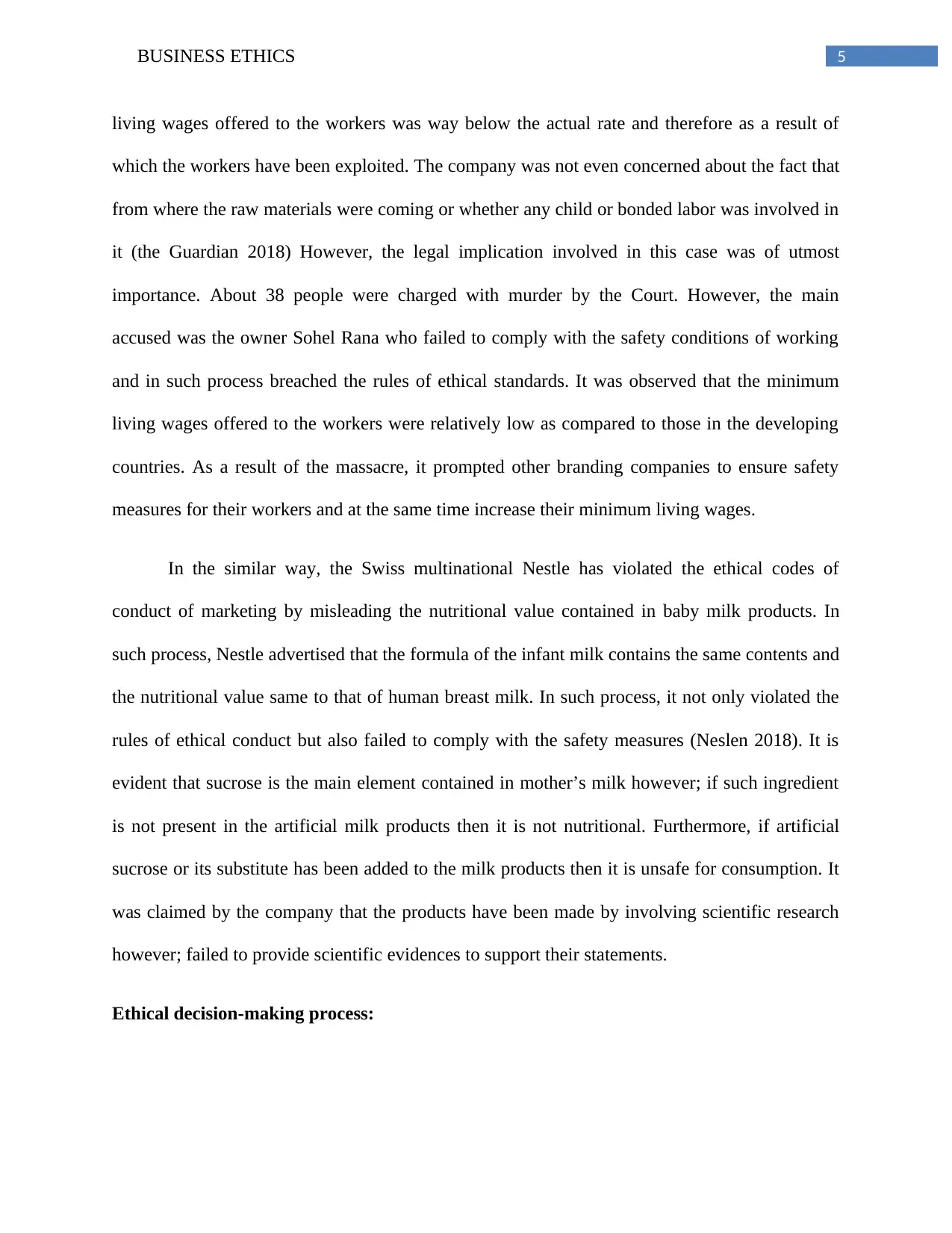
5BUSINESS ETHICS
living wages offered to the workers was way below the actual rate and therefore as a result of
which the workers have been exploited. The company was not even concerned about the fact that
from where the raw materials were coming or whether any child or bonded labor was involved in
it (the Guardian 2018) However, the legal implication involved in this case was of utmost
importance. About 38 people were charged with murder by the Court. However, the main
accused was the owner Sohel Rana who failed to comply with the safety conditions of working
and in such process breached the rules of ethical standards. It was observed that the minimum
living wages offered to the workers were relatively low as compared to those in the developing
countries. As a result of the massacre, it prompted other branding companies to ensure safety
measures for their workers and at the same time increase their minimum living wages.
In the similar way, the Swiss multinational Nestle has violated the ethical codes of
conduct of marketing by misleading the nutritional value contained in baby milk products. In
such process, Nestle advertised that the formula of the infant milk contains the same contents and
the nutritional value same to that of human breast milk. In such process, it not only violated the
rules of ethical conduct but also failed to comply with the safety measures (Neslen 2018). It is
evident that sucrose is the main element contained in mother’s milk however; if such ingredient
is not present in the artificial milk products then it is not nutritional. Furthermore, if artificial
sucrose or its substitute has been added to the milk products then it is unsafe for consumption. It
was claimed by the company that the products have been made by involving scientific research
however; failed to provide scientific evidences to support their statements.
Ethical decision-making process:
living wages offered to the workers was way below the actual rate and therefore as a result of
which the workers have been exploited. The company was not even concerned about the fact that
from where the raw materials were coming or whether any child or bonded labor was involved in
it (the Guardian 2018) However, the legal implication involved in this case was of utmost
importance. About 38 people were charged with murder by the Court. However, the main
accused was the owner Sohel Rana who failed to comply with the safety conditions of working
and in such process breached the rules of ethical standards. It was observed that the minimum
living wages offered to the workers were relatively low as compared to those in the developing
countries. As a result of the massacre, it prompted other branding companies to ensure safety
measures for their workers and at the same time increase their minimum living wages.
In the similar way, the Swiss multinational Nestle has violated the ethical codes of
conduct of marketing by misleading the nutritional value contained in baby milk products. In
such process, Nestle advertised that the formula of the infant milk contains the same contents and
the nutritional value same to that of human breast milk. In such process, it not only violated the
rules of ethical conduct but also failed to comply with the safety measures (Neslen 2018). It is
evident that sucrose is the main element contained in mother’s milk however; if such ingredient
is not present in the artificial milk products then it is not nutritional. Furthermore, if artificial
sucrose or its substitute has been added to the milk products then it is unsafe for consumption. It
was claimed by the company that the products have been made by involving scientific research
however; failed to provide scientific evidences to support their statements.
Ethical decision-making process:
⊘ This is a preview!⊘
Do you want full access?
Subscribe today to unlock all pages.

Trusted by 1+ million students worldwide
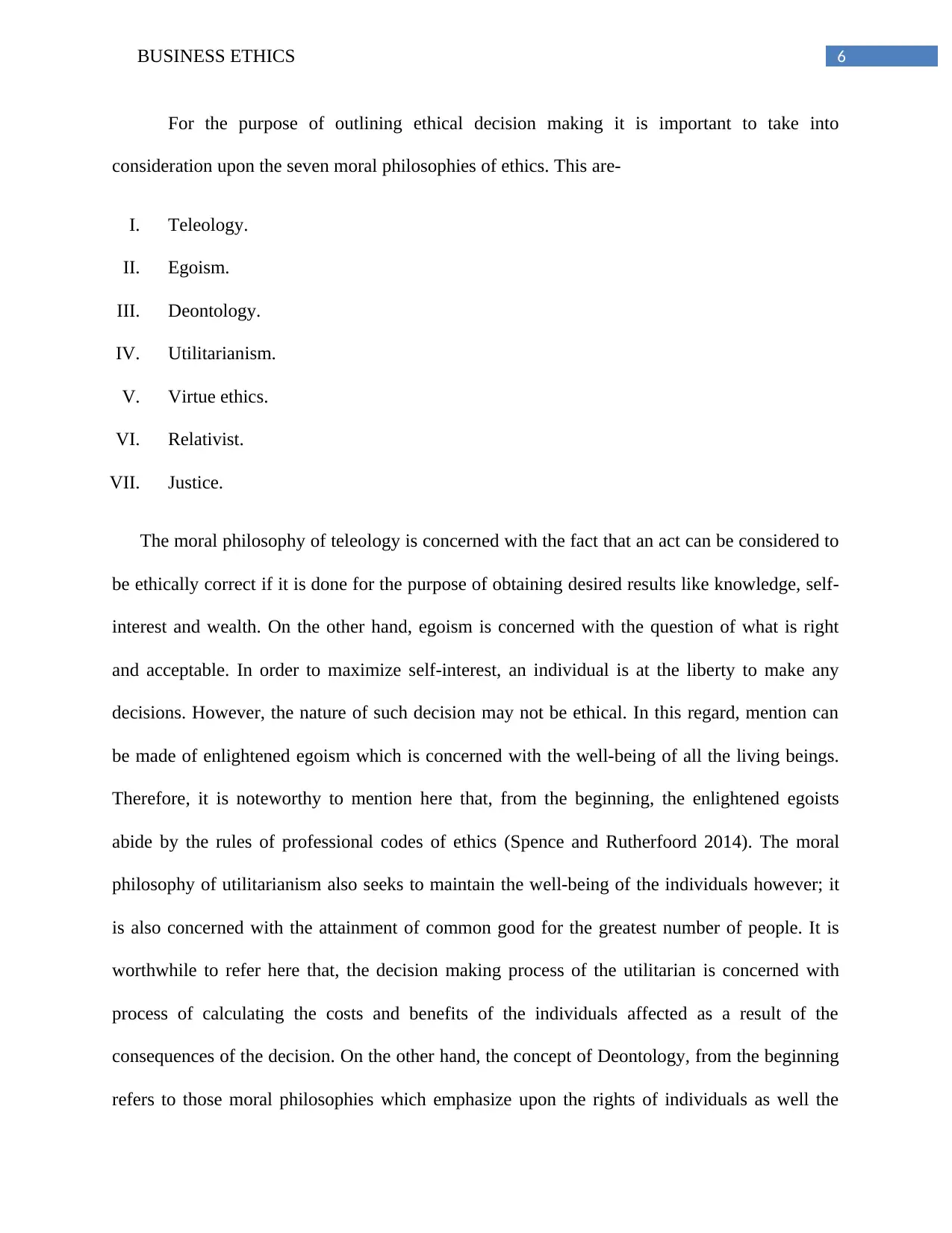
6BUSINESS ETHICS
For the purpose of outlining ethical decision making it is important to take into
consideration upon the seven moral philosophies of ethics. This are-
I. Teleology.
II. Egoism.
III. Deontology.
IV. Utilitarianism.
V. Virtue ethics.
VI. Relativist.
VII. Justice.
The moral philosophy of teleology is concerned with the fact that an act can be considered to
be ethically correct if it is done for the purpose of obtaining desired results like knowledge, self-
interest and wealth. On the other hand, egoism is concerned with the question of what is right
and acceptable. In order to maximize self-interest, an individual is at the liberty to make any
decisions. However, the nature of such decision may not be ethical. In this regard, mention can
be made of enlightened egoism which is concerned with the well-being of all the living beings.
Therefore, it is noteworthy to mention here that, from the beginning, the enlightened egoists
abide by the rules of professional codes of ethics (Spence and Rutherfoord 2014). The moral
philosophy of utilitarianism also seeks to maintain the well-being of the individuals however; it
is also concerned with the attainment of common good for the greatest number of people. It is
worthwhile to refer here that, the decision making process of the utilitarian is concerned with
process of calculating the costs and benefits of the individuals affected as a result of the
consequences of the decision. On the other hand, the concept of Deontology, from the beginning
refers to those moral philosophies which emphasize upon the rights of individuals as well the
For the purpose of outlining ethical decision making it is important to take into
consideration upon the seven moral philosophies of ethics. This are-
I. Teleology.
II. Egoism.
III. Deontology.
IV. Utilitarianism.
V. Virtue ethics.
VI. Relativist.
VII. Justice.
The moral philosophy of teleology is concerned with the fact that an act can be considered to
be ethically correct if it is done for the purpose of obtaining desired results like knowledge, self-
interest and wealth. On the other hand, egoism is concerned with the question of what is right
and acceptable. In order to maximize self-interest, an individual is at the liberty to make any
decisions. However, the nature of such decision may not be ethical. In this regard, mention can
be made of enlightened egoism which is concerned with the well-being of all the living beings.
Therefore, it is noteworthy to mention here that, from the beginning, the enlightened egoists
abide by the rules of professional codes of ethics (Spence and Rutherfoord 2014). The moral
philosophy of utilitarianism also seeks to maintain the well-being of the individuals however; it
is also concerned with the attainment of common good for the greatest number of people. It is
worthwhile to refer here that, the decision making process of the utilitarian is concerned with
process of calculating the costs and benefits of the individuals affected as a result of the
consequences of the decision. On the other hand, the concept of Deontology, from the beginning
refers to those moral philosophies which emphasize upon the rights of individuals as well the
Paraphrase This Document
Need a fresh take? Get an instant paraphrase of this document with our AI Paraphraser
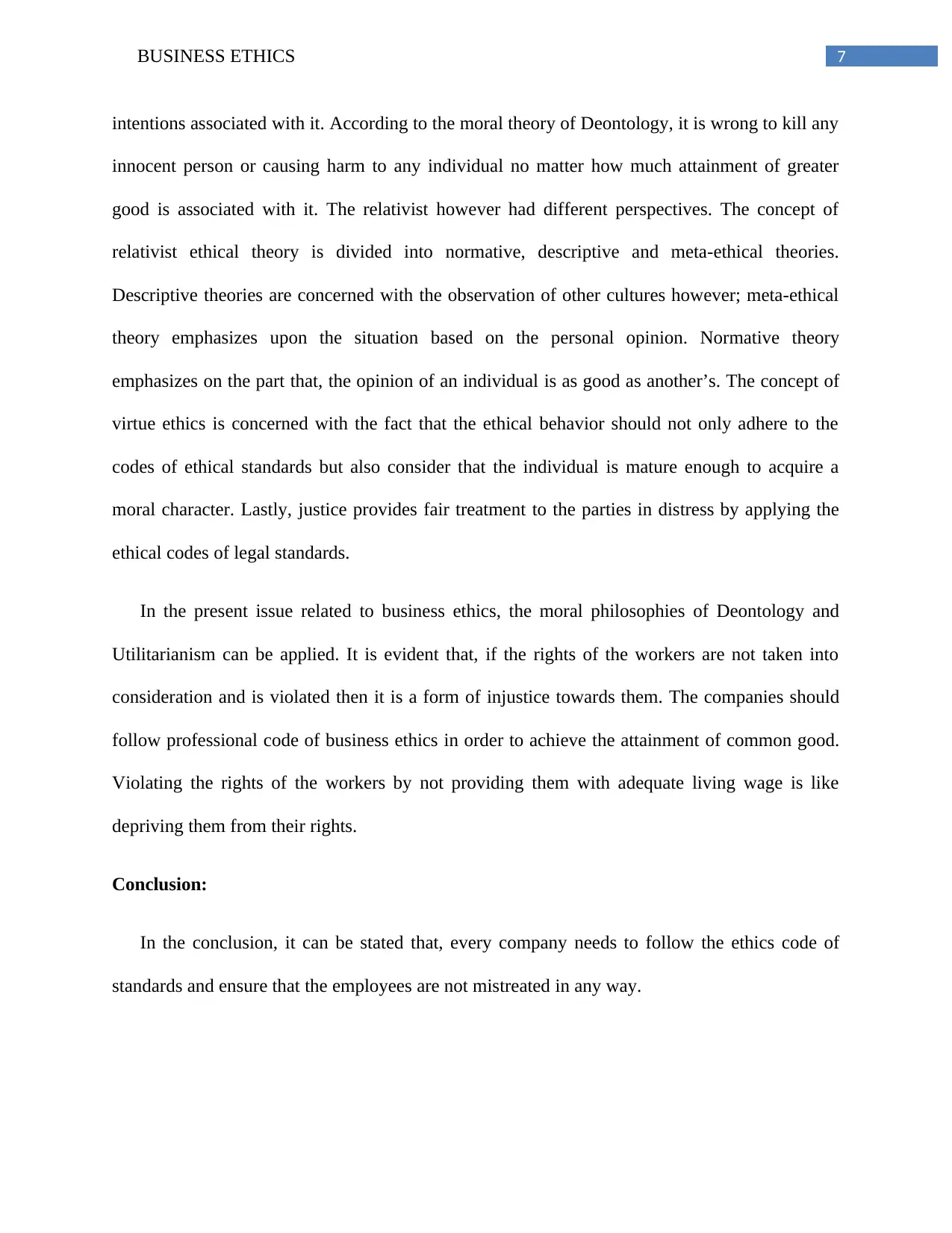
7BUSINESS ETHICS
intentions associated with it. According to the moral theory of Deontology, it is wrong to kill any
innocent person or causing harm to any individual no matter how much attainment of greater
good is associated with it. The relativist however had different perspectives. The concept of
relativist ethical theory is divided into normative, descriptive and meta-ethical theories.
Descriptive theories are concerned with the observation of other cultures however; meta-ethical
theory emphasizes upon the situation based on the personal opinion. Normative theory
emphasizes on the part that, the opinion of an individual is as good as another’s. The concept of
virtue ethics is concerned with the fact that the ethical behavior should not only adhere to the
codes of ethical standards but also consider that the individual is mature enough to acquire a
moral character. Lastly, justice provides fair treatment to the parties in distress by applying the
ethical codes of legal standards.
In the present issue related to business ethics, the moral philosophies of Deontology and
Utilitarianism can be applied. It is evident that, if the rights of the workers are not taken into
consideration and is violated then it is a form of injustice towards them. The companies should
follow professional code of business ethics in order to achieve the attainment of common good.
Violating the rights of the workers by not providing them with adequate living wage is like
depriving them from their rights.
Conclusion:
In the conclusion, it can be stated that, every company needs to follow the ethics code of
standards and ensure that the employees are not mistreated in any way.
intentions associated with it. According to the moral theory of Deontology, it is wrong to kill any
innocent person or causing harm to any individual no matter how much attainment of greater
good is associated with it. The relativist however had different perspectives. The concept of
relativist ethical theory is divided into normative, descriptive and meta-ethical theories.
Descriptive theories are concerned with the observation of other cultures however; meta-ethical
theory emphasizes upon the situation based on the personal opinion. Normative theory
emphasizes on the part that, the opinion of an individual is as good as another’s. The concept of
virtue ethics is concerned with the fact that the ethical behavior should not only adhere to the
codes of ethical standards but also consider that the individual is mature enough to acquire a
moral character. Lastly, justice provides fair treatment to the parties in distress by applying the
ethical codes of legal standards.
In the present issue related to business ethics, the moral philosophies of Deontology and
Utilitarianism can be applied. It is evident that, if the rights of the workers are not taken into
consideration and is violated then it is a form of injustice towards them. The companies should
follow professional code of business ethics in order to achieve the attainment of common good.
Violating the rights of the workers by not providing them with adequate living wage is like
depriving them from their rights.
Conclusion:
In the conclusion, it can be stated that, every company needs to follow the ethics code of
standards and ensure that the employees are not mistreated in any way.
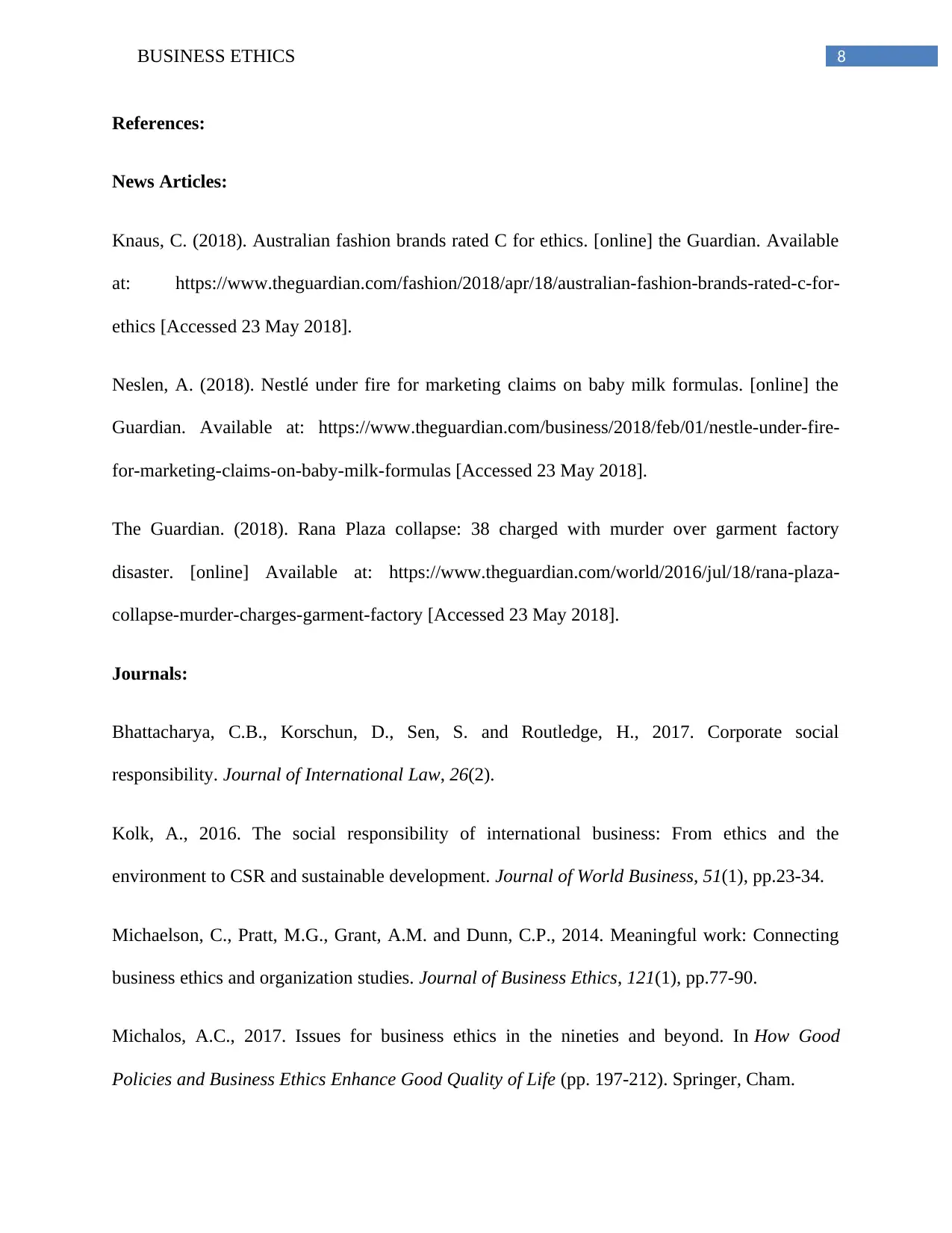
8BUSINESS ETHICS
References:
News Articles:
Knaus, C. (2018). Australian fashion brands rated C for ethics. [online] the Guardian. Available
at: https://www.theguardian.com/fashion/2018/apr/18/australian-fashion-brands-rated-c-for-
ethics [Accessed 23 May 2018].
Neslen, A. (2018). Nestlé under fire for marketing claims on baby milk formulas. [online] the
Guardian. Available at: https://www.theguardian.com/business/2018/feb/01/nestle-under-fire-
for-marketing-claims-on-baby-milk-formulas [Accessed 23 May 2018].
The Guardian. (2018). Rana Plaza collapse: 38 charged with murder over garment factory
disaster. [online] Available at: https://www.theguardian.com/world/2016/jul/18/rana-plaza-
collapse-murder-charges-garment-factory [Accessed 23 May 2018].
Journals:
Bhattacharya, C.B., Korschun, D., Sen, S. and Routledge, H., 2017. Corporate social
responsibility. Journal of International Law, 26(2).
Kolk, A., 2016. The social responsibility of international business: From ethics and the
environment to CSR and sustainable development. Journal of World Business, 51(1), pp.23-34.
Michaelson, C., Pratt, M.G., Grant, A.M. and Dunn, C.P., 2014. Meaningful work: Connecting
business ethics and organization studies. Journal of Business Ethics, 121(1), pp.77-90.
Michalos, A.C., 2017. Issues for business ethics in the nineties and beyond. In How Good
Policies and Business Ethics Enhance Good Quality of Life (pp. 197-212). Springer, Cham.
References:
News Articles:
Knaus, C. (2018). Australian fashion brands rated C for ethics. [online] the Guardian. Available
at: https://www.theguardian.com/fashion/2018/apr/18/australian-fashion-brands-rated-c-for-
ethics [Accessed 23 May 2018].
Neslen, A. (2018). Nestlé under fire for marketing claims on baby milk formulas. [online] the
Guardian. Available at: https://www.theguardian.com/business/2018/feb/01/nestle-under-fire-
for-marketing-claims-on-baby-milk-formulas [Accessed 23 May 2018].
The Guardian. (2018). Rana Plaza collapse: 38 charged with murder over garment factory
disaster. [online] Available at: https://www.theguardian.com/world/2016/jul/18/rana-plaza-
collapse-murder-charges-garment-factory [Accessed 23 May 2018].
Journals:
Bhattacharya, C.B., Korschun, D., Sen, S. and Routledge, H., 2017. Corporate social
responsibility. Journal of International Law, 26(2).
Kolk, A., 2016. The social responsibility of international business: From ethics and the
environment to CSR and sustainable development. Journal of World Business, 51(1), pp.23-34.
Michaelson, C., Pratt, M.G., Grant, A.M. and Dunn, C.P., 2014. Meaningful work: Connecting
business ethics and organization studies. Journal of Business Ethics, 121(1), pp.77-90.
Michalos, A.C., 2017. Issues for business ethics in the nineties and beyond. In How Good
Policies and Business Ethics Enhance Good Quality of Life (pp. 197-212). Springer, Cham.
⊘ This is a preview!⊘
Do you want full access?
Subscribe today to unlock all pages.

Trusted by 1+ million students worldwide
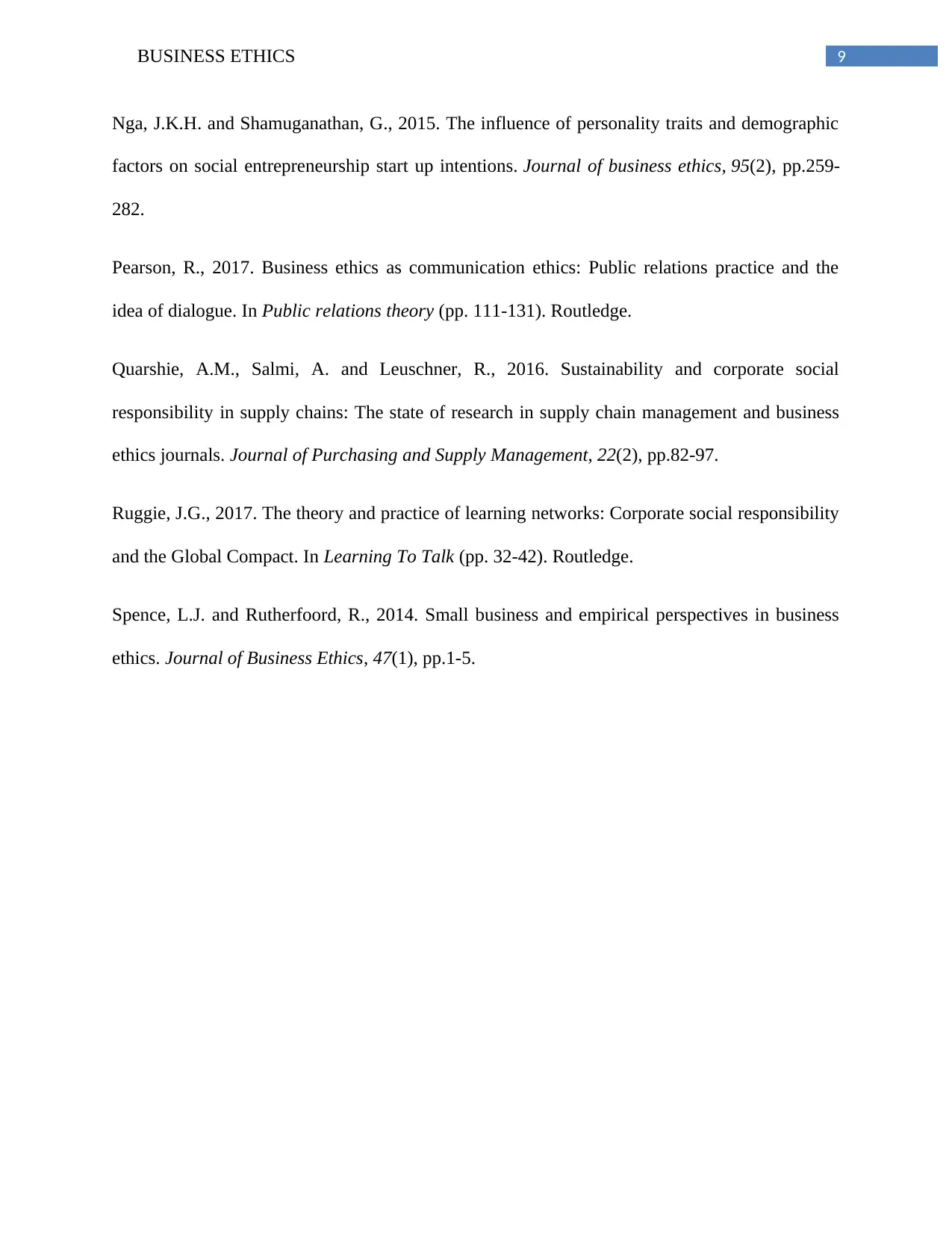
9BUSINESS ETHICS
Nga, J.K.H. and Shamuganathan, G., 2015. The influence of personality traits and demographic
factors on social entrepreneurship start up intentions. Journal of business ethics, 95(2), pp.259-
282.
Pearson, R., 2017. Business ethics as communication ethics: Public relations practice and the
idea of dialogue. In Public relations theory (pp. 111-131). Routledge.
Quarshie, A.M., Salmi, A. and Leuschner, R., 2016. Sustainability and corporate social
responsibility in supply chains: The state of research in supply chain management and business
ethics journals. Journal of Purchasing and Supply Management, 22(2), pp.82-97.
Ruggie, J.G., 2017. The theory and practice of learning networks: Corporate social responsibility
and the Global Compact. In Learning To Talk (pp. 32-42). Routledge.
Spence, L.J. and Rutherfoord, R., 2014. Small business and empirical perspectives in business
ethics. Journal of Business Ethics, 47(1), pp.1-5.
Nga, J.K.H. and Shamuganathan, G., 2015. The influence of personality traits and demographic
factors on social entrepreneurship start up intentions. Journal of business ethics, 95(2), pp.259-
282.
Pearson, R., 2017. Business ethics as communication ethics: Public relations practice and the
idea of dialogue. In Public relations theory (pp. 111-131). Routledge.
Quarshie, A.M., Salmi, A. and Leuschner, R., 2016. Sustainability and corporate social
responsibility in supply chains: The state of research in supply chain management and business
ethics journals. Journal of Purchasing and Supply Management, 22(2), pp.82-97.
Ruggie, J.G., 2017. The theory and practice of learning networks: Corporate social responsibility
and the Global Compact. In Learning To Talk (pp. 32-42). Routledge.
Spence, L.J. and Rutherfoord, R., 2014. Small business and empirical perspectives in business
ethics. Journal of Business Ethics, 47(1), pp.1-5.
1 out of 10
Related Documents
Your All-in-One AI-Powered Toolkit for Academic Success.
+13062052269
info@desklib.com
Available 24*7 on WhatsApp / Email
![[object Object]](/_next/static/media/star-bottom.7253800d.svg)
Unlock your academic potential
Copyright © 2020–2026 A2Z Services. All Rights Reserved. Developed and managed by ZUCOL.





